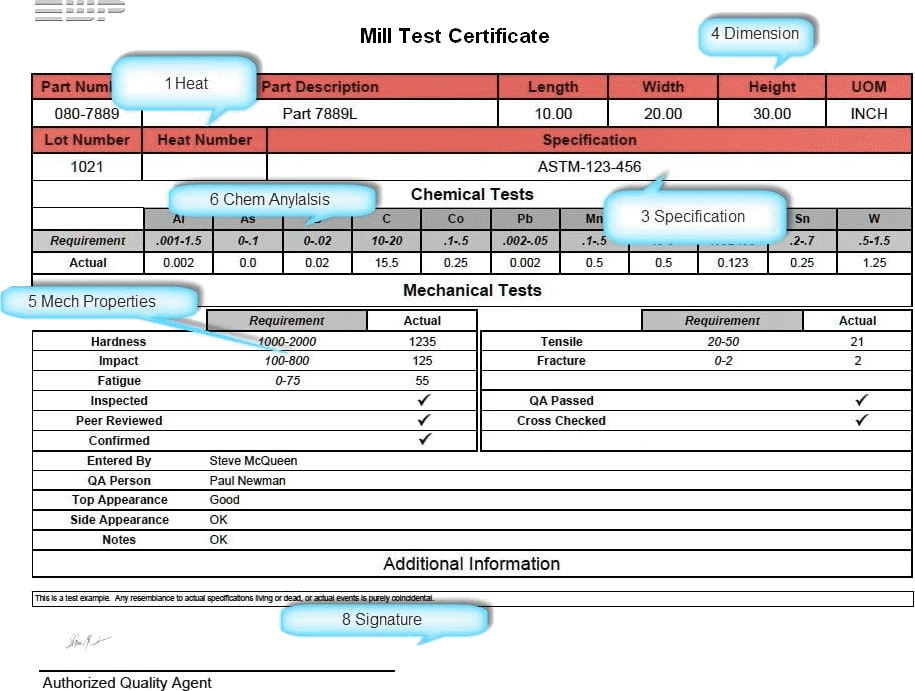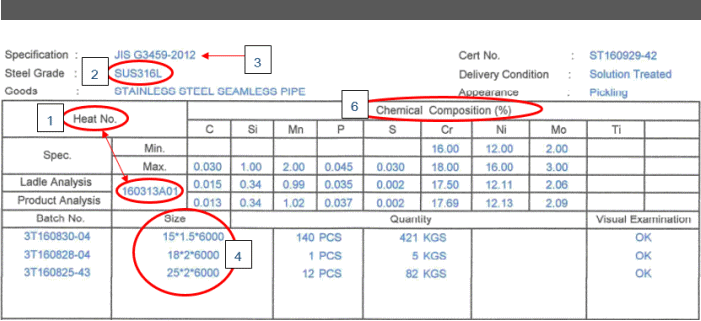Mill Test Certificate
The Mill Test Certificate, or also known as Material Test Certificate, plays an important role in quality control of materials in several industries, including manufacturing, construction and oil and gas. But often many users find it difficult to understand the certificates.
This article introduces you to material test certificates, explains their meaning and outlines issues you may encounter with your manufacturer or supplier.
What is a Mill Test Certificate?
The Mill Test Certificate (MTC), also known as a material test report, is a document that verifies the chemical and physical properties of a material. Usually, the report is written on paper and contains the approval of the factory quality control along with a special stamp of the material test certificate.
The test standards and contents of the report usually correspond to the factory's production standards or the customer's specific requirements. The report includes detailed information about the material's composition, including type, quality and specification, as well as the results of various tests the material was subjected to, such as tensile strength, yield strength and more.
Who can issue the Mill Test Report?
The material test report or rolling mill test report/certificate is usually provided by the manufacturer before the products leave the factory.
However, sometimes a quality control third party may issue the report, depending on specific requirements. For example, the manufacturer may only meet the requirements contained in an EN10204 3.1 certificate. If you (as a customer) ask for an EN10204 3.2 certificate, you need a third party with sufficient qualifications to issue the certified material test report.

What is the purpose of a Mill Test Certificate?
There are two main points as to why the material testing certificate is important..
- Verification of product quality.. The certified material test report serves as proof of the quality of the product from the factory, verifying that it has been tested and meets the required standards. The report must accompany the product, and each product must have its own individual MTC
- Improved transparency and traceability.. The oil mill certificate also improves transparency and traceability throughout the production process. Using the mill test certificate, the mill's production record and test results for the specific product can be traced
What Information Is Included in a Mill Test Report?
It is worth noting that test methods and content vary depending on the materials being tested.
For steel products, an MTC typically includes the following test standards..
- The name, address and contact information of the manufacturer
- The product specification and standards, heat number and quantity
- The analysis of the chemical composition of the product
- The results of testing the mechanical properties
- The report may also include any other required testing, such as hardness, impact testing and non-destructive testing
The report should include detailed test results for each test, along with all necessary approvals from the plant quality control department.
What are common problems with material test certificates?
Below are some of the common problems that can occur with the report..
- Smaller factories may not have the testing capacity to perform the standard or required test. They may issue certificates without actually testing.
- Certain trading companies may intentionally hide the original manufacturer of the materials to prevent customers from knowing their Reference(s). They may use their own company name to replace the manufacturer's actual information.
- Suppliers may sometimes issue test certificates for materials that contain inaccurate or misleading information or that do not match the materials of the order.
- Customers may not fully understand the meaning and importance of the report, making it difficult for them to recognize its accuracy and quality.
- Some suppliers of material test reports may not include a stamp or signature from the quality control department and therefore should be considered invalid.
How to Reduce Risks Associated with Mill Test Certificates?
There are several measures you can take to minimize the fraudulent risks associated with mill inspection certificates. Here are some of our tips..
- Pay close attention to the report and treat them as an integral part of the product
- Request the original valid certificate from the supplier and always ask him to show it during inspections
- Consider having the products sampled on site by a third-party inspector
- Use third-party laboratory testing to verify that the information in the certificate matches the results
Conclusion
Mill test reports are an important document that verifies the chemical and physical properties of a material and provides detailed information on the manufacturer's test methods.
But relying solely on the material test certificates issued by the manufacturer is not always sufficient to ensure the accuracy and reliability of the material. In some cases, it may be wise to enlist the help of a third party to verify the results.
Related Post(s)

A heat number is a unique identifier stamped on a piece of metal to give information about its origin...